Congratulations!!! 👏 You’ve received an EU university acceptance! You’ve taken the very first step to achieve your dreams. Believe me, don’t let anyone undermine this achievement. Being accepted into university isn’t an easy thing nor a minor feat. Well done to you, honestly!
Now that you’ve been accepted, there are a couple of things that you now need to deal with till you get to university and start your program.
Essential Steps After Receiving EU University Acceptance
- 1. Tuition fee & Acceptance letter: If your program requires you to pay, you’re going to need to pay the tuition fee to receive a formal acceptance letter which you can use to apply for your visa. It’s important to check with your university what the exact procedure for this is. They usually provide you with an invoice which you can take to your bank to make a payment. The first letter they issue you is likely a Conditional EU University Acceptance letter, so please check the details carefully so you don’t waste any time.
- 2. Visa Procedure: Typically, you’ll need to submit a visa application to the embassy or consulate of the country you plan to visit. The application process may include providing proof of travel arrangements, accommodation, financial means, travel insurance, and the purpose of your visit (which in your case should be studies) so please read the requirements carefully. In addition, some countries in the EU like Lithuania, suggest you apply for your Temporary residence permit instead of a Visa whilst you’re still in your home country, so be sure to understand your options. So, check the following:
- – Visa or permit options for studies based on the country.
- – Biometric requirements.
- – Passport validity requirements.
- – Flight reservation/booking requirements.
- – Proof of financial means requirements.
- – Proof of accommodation requirements.
- – Travel insurance requirements.
- – Cost of visa or permit applications.
- – Processing time of visa or permit applications.

- 3. Reserving accommodation: This is particularly important for countries where the university doesn’t provide its students with any accommodation such as dormitories. You’ll need to make sure you have a place to stay when you get there, however, beware of scams. I share some tips on how to find accommodation in my article Finding Housing Abroad.
- 4. What to bring with you: You may be required to bring some original copies of your documents for permit applications or university registration. That would be documents such as police clearances or original copies of your high school diplomas and so forth. You need to have a checklist prepared so you don’t forget these things. Always check in with your university for what additional documentation is required for registration. I also share some other info in my article Moving Abroad: Packing Essentials about what to pack in your suitcase and hand-luggage when you travel.
- 5. Medical checks: It may take a while for you to get used to the medical system here in the EU, so I recommend you do your dental checks, eyes, full medical before you come. Some common things to get vaccinated against are Hepatitis A & B and depending which region you’re going to; I also recommend Tick-borne encephalitis vaccine.
So, remember that visa requirements can change, and it’s crucial to check the latest information on the official website of the embassy or consulate of the country you’re going to study in. If you’re going to be in a Schengen state and getting a visa for one of the countries in this group, you’ll have border-free roaming, which, I must say, is just so awesome!!!!
Embrace the journey, don’t panic and be prepared to explore and enjoy your time. Be positive and you’ll have a fantastic experience!
Related Posts

